#selections from the canzoniere
Explore tagged Tumblr posts
Text
The poet finds that he is unable to write, and yet is forced to write. Writing helps him, yet it is writing that makes him suffer because of his love, for which only writing can provide the cure. A double paradox. Love leads to poetry while poetry creates love and preserves it.
Mark Musa, from the introduction to Selections from the Canzoniere
5 notes
·
View notes
Text

Chapter 11
Crystal Trees
More and more birds came to greet us. Suddenly the air began to sparkle and we stood in front of a building made of crystal trees, as clear as Waters of the mountain spring[22]. "That lovely light.[23] How is it possible that the trees are made of crystal?" I asked in amazement. "Nobody knows. We don't know if they are from this world or from another. But they shine beautifully, that's why most birds like them. These we call Merchants of Light.[24]"
The building inside was full of shops and restaurants. A lot of birds were inside and seemed to be enjoying their time. "It's amazing here," I marveled. "I feel like I'm in a palace." "Yes, it's pretty great here, but we always have to destroy the crystal trees that are spreading, because the crystal has a way of disrupting nature."
Only now do I notice that everywhere the trees sprout from the ground, the soil is barren and nothing grows on it. "Why don't you destroy them?" I asked. "They are one of our main sources of income because we can sell the crystals." " Interesting," I mumbled
[22]Petrarch, The Canzoniere
[23]Petrarch, The Canzoniere
[24]Bacon, Selected Philosophical Works

0 notes
Note
Bruh!
(sigh)
Anyway, here's the list from back in the day. Nowadays, the exam list is very different, much more inclusive of non-Western, non-European texts, and the department even added film as a potential category.
Epic— Homer: Iliad Homer: Odyssey Vergil: Aeneid Dante: Divine Comedy: Inferno Milton: Paradise Lost
Lyric— Sappho: Lyric Poems and Fragments Petrarch: Canzoniere: 1-5, 16, 23, 30, 35, 52, 126, 129, 189-190, 234, 264, 267, 281, 310, 323, 348, 359, 362, 364-366 Milton: "Lycidas" Keats: "Ode on a Grecian Urn," "Ode to a Nightingale" Baudelaire: Les fleurs du mal Rilke: Sonnets to Orpheus Yeats: Selected Poems: "The Secret Rose," "Easter 1916," "The Second Coming," "Sailing to Byzantium," "Leda and the Swan," "Among School Children," "Byzantium," "Lapus Lazuli," "The Circus Animals' Desertion," "The Tower," "A Dialogue of Self and Soul," "Crazy Jane" poems
Drama— Aeschylus: Oresteia Sophocles: Oedipus Rex Euripides: Bacchae Aristophanes: The Clouds Shakespeare: Hamlet, King Lear Molière: Misanthrope Büchner: Woyzeck Ibsen: Hedda Gabler Chekhov: The Cherry Orchard Brecht: Mother Courage and Her Children Beckett: Waiting for Godot
Novel— Cervantes: Don Quixote La Fayette: The Princess of Cleves Brontë: Wuthering Heights Melville: Moby Dick Flaubert: Madame Bovary Dostoevsky: The Idiot Proust: Swann's Way Joyce: Ulysses Woolf: Between the Acts
Other— Old Testament: Genesis, Exodus New Testament: Matthew, Acts, Epistle to the Romans, Revelation Plato: Symposium, Phaedrus Aristotle: Poetics Augustine: Confessions Swift: Gulliver's Travels Voltaire: Candide Diderot: Rameau's Nephew Goethe: Faust Kafka: Metamorphosis
When I was a junior in college, I took a course on Dostoevsky in which we read The Idiot, among novels. I remember really liking it, but I don't remember the hedgehog. I guess I might need to read it again.
Yeah man i admittedly have never read it in its entirety but it didn't seem like a hedgehog sidekick kinda book 💀
5 notes
·
View notes
Note
hello there ,i love your blog it brings me great comfort , if it's not too much trouble could you make a compilation about unrequited love, my situation is the i'm in love with someone that just wants to take from me and give nothing back, i will break up with him today but i'm feelling very sad about this , i hope you are doing well and have good things in life bye bye and sorry to bother you
i’m so sorry for what you’re going through but so proud of you for walking away. you can check out this compilation that i made; here are a few more:
“My heart is full not of guilt, or shame, or remorse, but of grief… Everything has become too terribly mixed up.”
Boris Pasternak, from Letters Summer 1926: Pasternak, Tsvetaeva, Rilke
“But if it’s love, by God, what is this thing? If good, why then the bitter mortal sting?”
Petrarch, from the ‘Canzoniere’ (tr. Mark Musa)
“He filled her up, her whole world, a moon obliterating the light of any other star.”
Catherynne M. Valente, from Deathless

Anne Carson, from Plainwater: Essays and Poetry
“If I let him do this to me, what else will I allow? Anything, anything, anything.”
Catherynne M. Valente, from Deathless
“God, what are you doing to me? / What am I doing to myself?”
Adonis, from ‘Concerto for the Veiled Christ’, Selected Poems (tr. Khaled Mattawa)

David Mitchell, Slade House
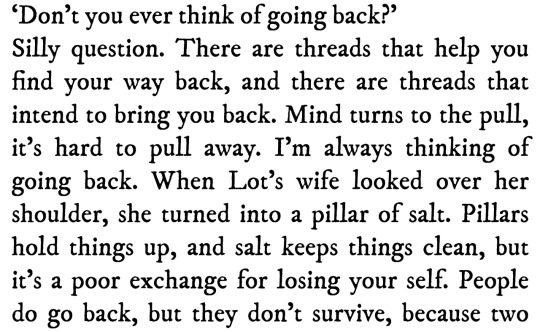

Jeanette Winterson, Oranges Are Not the Only Fruit
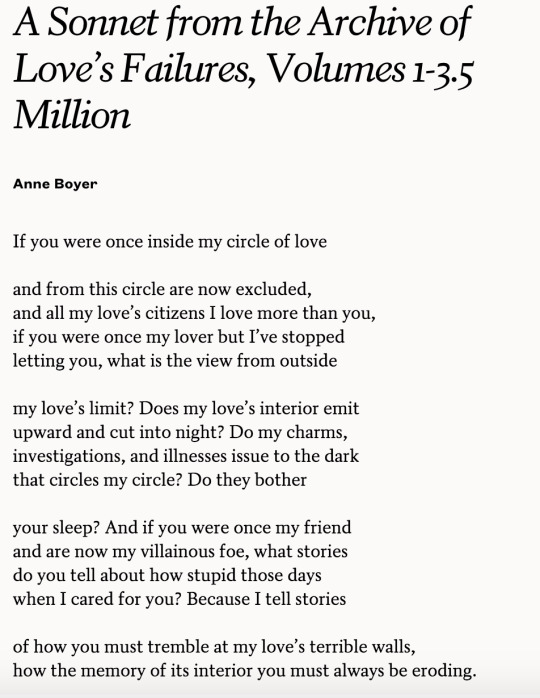
“I want to give you everything. This is called a sickness.”
Camille Rankine, from Possession
“Love that incorporates, that devours the other person, that cuts the tendons of the will. Love as immolation of the self.”
Susan Sontag, from Reborn: “July, 1958”
“Love isn’t always magic. Sometimes it’s just melting. Where it’s black and blue. Where it hurts the most.”
Andrea Gibson, from The Madness Vase; “Maybe I Need You”
“Love? I wanted to go with him, to be on the strong side, for him to spare me, like one who seeks shelter in the arm of the enemy to stay far from his arrows. It was different than love, I was finding out: I wanted him as a thirsty person desires water, without feelings, without even wanting to be happy.”
Clarice Lispector, Complete Stories
“Isn't there / always something we want / more than our own happiness? / A pull toward the Fall. / Haven't we all loved too much?”
Danusha Laméris, from The Moons of August; “Apples”
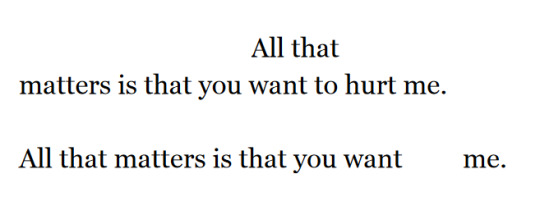
Yves Olade, from When Rome Falls; Bloodsport, 2017
“You have done this a hundred times. Will always do it. Always. I’m so tired of your lack of everything thoughtful, wise about you. You act like a child, a child that just asks and asks and never thinks and sucks one to death, and I’m sitting here crying because it’s so hopeless to ever expect you to be otherwise.”
Anaïs Nin, in a letter to Henry Miller
“Why should anyone go through so much in order to be treated right?”
Alice Notley, Culture of One
“Another moment and I will tell you: it’s not joy but torture you give me. I’m drawn to you as to a crime—”
Osip Mandelstam, from Selected Poems; “Feodosia”
“I felt a terrified pity for him, for this man who lived in such strange, secret places that, if I loved him enough to follow him, I should have to die.”
Angela Carter, from The Bloody Chamber and Other Stories; “The Bloody Chamber”

Ingeborg Bachmann, from The Book of Franza (tr. Jan van Heurck)
“Desolately we parted. Dear one. When we really parted later on, there were no tears, no comfort either. Something like anger on your side, resolution on mine; each of us understood the other. We were not yet through with each other. To separate that way is harder, easier.”
Christa Wolf, Cassandra: A Novel and Four Essays (tr. Jan van Heurck)
[ON LOSING LOVE]: This is the model I propose. You are arriving home and as you approach the garage you try to work your routine magic. Nothing happens; the doors remain closed. You do it again. Again nothing. At first puzzled, then anxious, then furious with disbelief, you sit in the driveway with the engine running; you sit there for weeks, months, for years, waiting for the doors to open. But you are in the wrong car, in front of the wrong garage, waiting outside the wrong house. One of the troubles is this: the heart isn't heart shaped.
Julian Barnes, A History of the World in 10 and 1/2 Chapters
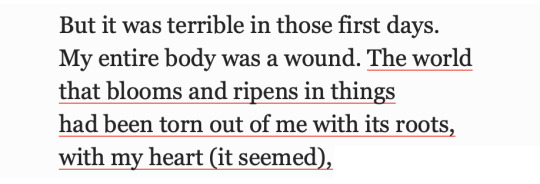
Rainer Maria Rilke, The Book of Images
“It isn’t, our story isn’t—isn’t a story anyone would have chosen to live. But, I had to ask myself…would you change it if you could? Would you? And I had to realize that I wouldn’t. So—that’s all there is to that.”
James Baldwin, Tell Me How Long the Train’s Been Gone

Nikki Giovanni, from “[Untitled]”
...nothing remains of you but the memory of something painful, close to breaking or being lost, and somehow very near extinction.
...no me queda de ti más que esa reminiscencia de una cosa doliente, próxima a quebrarse o a perderse, cerca ya, de cualquier manera a su extinción.
Dulce María Loynaz, Absolute Solitude: Selected Poems; “Poema LVI” (tr. James O’Connor)

Sandra Cisneros, “Mariela”
#i know how hard it is to walk away from that kind of complicated love. i hope you find all the healing in the time that comes now <333#the dark's his bone#the great wound#compilation#quote compilation#...#long post
478 notes
·
View notes
Text
#BannedBooksWeek: 16th-Century Censorship
If you think banning books is solely a modern pastime, stop by Special Collections to take a look at this 1541 edition of Petrarch’s Canzoniere.
The book was not banned in its entirety, but some sonnets were subject to censorship by the Catholic Church via the Index Expurgatorius. This index required the expurgation of selected sonnets from previously printed editions and prohibited printing in…
View On WordPress
1 note
·
View note
Quote
"I freeze and burn, love is bitter and sweet, my sighs are tempests and my tears are floods, I am in ecstasy and agony, I am possessed by memories of her and I am in exile from myself."
Francesco Petrarca, Canzoniere: Selected Poems
1 note
·
View note
Text
Langblr Secret Santa
Hiya my dear @genderqueerfujioka , I’m your Secret Santa and here to spread some Langbrl joy! Since the Langblr coordinator told me you were interested in Italian and Literature I thought, I might share a short introduction to Italian Literature with you as it is the thing I’m currently studying in university. However, when stalking your profile, I couldn’t help but notice that you are very interested in learning Swedish at the moment, which is why I have created a second gift for you. This way, you can decide which language you want to focus on today and keep the other one for Boxing Day or New Years. (Or open it right away as well.)
If you want to be a pro at Italian Literature (or seem like it) you have to know these three drama queens:
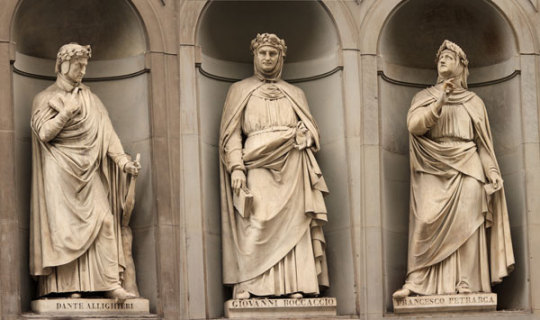
From the left to the right they are Dante Alighieri, Giovanni Boccaccio and Francesco Petrarca (also known as Petrarch). They are also called the “tre corone” which means “three crowns” and even though they published all of their works in the 14th century they are still considered the finest literature one could possibly read. (They are like Italian Shakespeares basically and everyone’s obsessed with them.)
Let’s start with the first one, shall we? Dante was a pretty cool guy. Born in 1265 in Florence he first became a politician, but since he choose the wrong party (there were two oppositional parties in Florence at that time and they were at each other's throats) he had to flee from Florence in 1301, which the other party used to deny him entrance into the city for the rest of his life. (If he had paid enough money maybe they would’ve let him back in but he wasn’t really interested in that.) Dante then basically founded Italian Literature as he used the “volgare” (the language of the common folk in Florence at that time) as the language of his stories. (Before him it was all Latin, from then on all the authors wrote in the Florentine accent because through Dante it became cool.) His most famous work is “La Divina Commedia” (“The Divine Comedy”) in which Vergil, a Latin poet, as well as one of his lovers, Beatrice, lead him through the three realms of the dead. (Hell, Purgatory and Paradise.) Sort of ancient fantasy literature which also teaches about theology, philosophy and also about science at that time. He died in 1362.
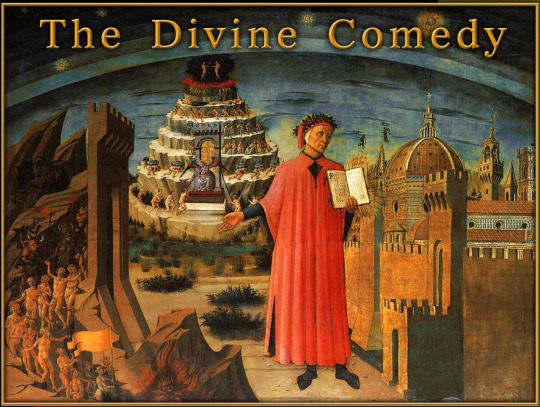
Boccaccio was a little bit more chill, he was also a politician (born in 1313 in Florence as well) but instead of getting send into exile he kept calm, travelled a lot and wrote a set of 100 novels called “Il Decameron” (from deka=ten and hemera=day because it takes place within ten days). The novels are all centred around a group of ten young people that flee from the plague in 1348 and lift in the countryside for ten days. (Obviously, the plague wasn’t over within 10 days but it’s a story after all.) During those days they each told a story every day and then the one who had told the best story was selected king or queen of that day. The novels all take place among normal, upper-class people (merchants most of all) and are focused on the intelligence of the characters, which was something quite new at that time. Boccaccio was also obsessed with Dante and literally wrote a biography about him, there was that much enthusiasm. (Even though Dante didn’t return it.) He died in 1375.
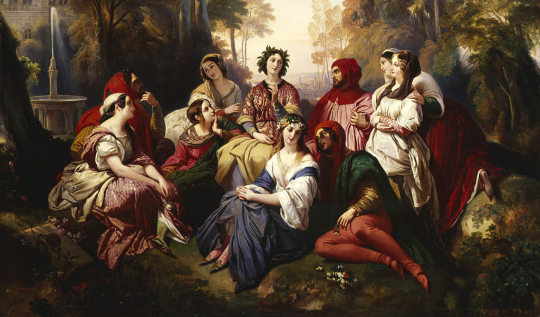
Last but not least Petrarch. (I’m gonna call him that even though his actual name was Petrarca but Petrarch is more common among English speakers.) He was born in 1304 and—not, not Florence, but Arezzo, Italy. As his dad was a politician, who worked close to Avignon, Petrarch grew up in France, in a rural area close to the Mont Ventoux. Why does this matter, you might ask? Well, because Petrarch one day (in 1336) decided to climb up that mountain (most people at that time had better things to do than to climb up random mountains, so it was quite unusual for him to do so) but what made this hike so special is, that he wrote about it in a letter to Francesco Dionigi. In this letter, he has the spectator was in the centre which was a massive cut in the experience of nature and landscapes in the 14th century. Suddenly the entire aesthetic changed because suddenly there wasn’t just nature but a reflection of your innermost self within the things you see in front of you. Petrarch was a poet and also the founder of the (Italian) sonnet (which was later copied by many Englishman and once it was already out fashion picked up by Shakespeare to be cool again, so Petrarch is the reason why people are able to obsess over Shakespeare’s sonnets) but most of all he changed the worldview from being centred on God and his creation to being focused on the self and your feelings. In his poems, the “Canzoniere” (consisting of 366 poems) he wrote about one thing: His love for a girl called Laura. When Petrarch first met her, she was already bound to another man, but that didn’t keep him from loving her. He wrote to her 266 poems “in vita” (so whilst she was still alive) and 100 “in morte” (once she had died), talking about his feelings about her and so on. (By the way, they weren’t just sonnets but also songs and ballads.) I’d also have to mention, that the Italian sonnet differs from the (standard) English sonnet: Both have 14 lines but whilst Shakespeare had three quatrains (abab cdcd efef) followed by a heroic couplet (gg), the original Petrarchan sonnet consisted of a rhyming octave (abbaabba) followed by a rhyming sestet (cdcdcd).
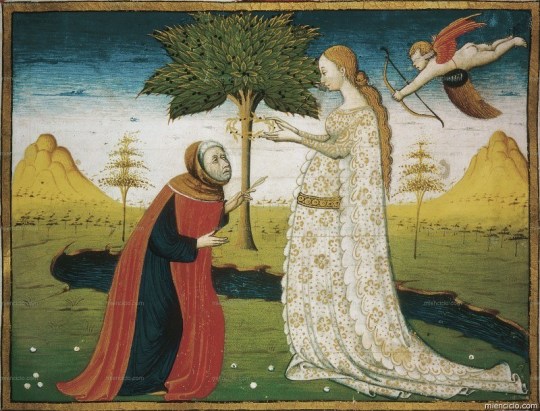
To include some actual Italian, here’s Petrarch's XXXV (35th) poem. (I included an English version below so that you can understand it properly, but I’d definitely encourage you to try and read it the way it is.)
Solo et pensoso i piú deserti campi vo mesurando a passi tardi et lenti, et gli occhi porto per fuggire intenti ove vestigio human l'arena stampi.
Altro schermo non trovo che mi scampi dal manifesto accorger de le genti, perché negli atti d'alegrezza spenti di fuor si legge com'io dentro avampi:
sí ch'io mi credo omai che monti et piagge et fiumi et selve sappian di che tempre sia la mia vita, ch'è celata altrui.
Ma pur sí aspre vie né sí selvagge cercar non so ch'Amor non venga sempre ragionando con meco, et io co llui.
(And now the English version)
Alone and thoughtful, through the most desolate fields, I go measuring out slow, hesitant paces, And keep my eyes intent on fleeing Any place where human footsteps mark the sand.
I find no other defence to protect me From other people’s open notice, Since in my aspect, whose joy is quenched, They see from outside how I flame within.
So now I believe that mountains and river-banks And rivers and forests know the quality Of my life, hidden from others.
Yet I find there is no path so wild or harsh That love will not always come there Speaking with me, and I with him.
So, first of all, you can probably totally tell, that this poem is about how in love he is and even though he’s trying to hide it from people, it’s not really working out the way he planned it. I’m not going to go on about the verse rhythms and stuff like that, but I would like to point out (a) the beautiful form of the Italian sonnet and (b) the connection between the nature (fields, sand, mountains, river-banks) and his feelings, wanting to find a path that hides him from people and most importantly lets him escape love. (But, as he precisely states, there is no such path.)
There are lots of other Italian writers (like Giacomo Leopardi, who totally looks like Eddie Redmayne and was one of the first romanticists or Carlo Goldoni, who was super important for the Italian Drama, which in itself it a whole other story) but if you know the tre corone, people are going to be super impressed and their works are also great reads. Personally, I most enjoy Boccaccio because his stories are quite simple, but Petrarch's poetry is nice too and if you’ve got the time, maybe one day you’ll read into “La Divina Comedia”. (I honestly tried but couldn’t do it.)
I hope you enjoyed your gift! If you want to talk about Italian Literature (or Drama or poetry) you can text me anytime. I know, that this isn’t exactly a vocabulary list or anything like that, but I always enjoyed not only learning my target language but also a few of the cultural backgrounds so hopefully, we’re on the same track here. Happy holidays and have a good new year!
#langblr#secret santa#langblr secret santa#italian#italian literature#dante#dante alighieri#petrarch#francesco petrarca#boccaccio#tre corone#la divina comedia#the devine comedy#langblrsecretsanta2017
3 notes
·
View notes
Text
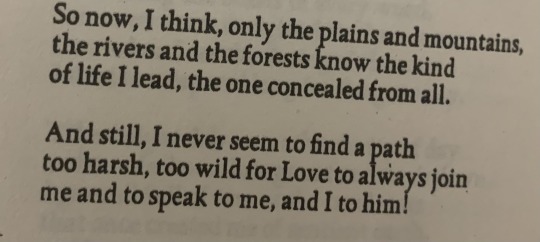
Petrarch, Selections from the Canzoniere
17 notes
·
View notes
Text

Petrarch, Selections from the Canzoniere
19 notes
·
View notes
Note
Your blog's *chef's kiss* and I wish to ask do you have any quotes or what comes to mind when it comes to love mingled with grief/pain? Like losing someone at the stinging cost of the other? Or looking at a completed wonderful thing but knowing the pain and blood it stands on to be that way? Or when you look at someone realizing you now share hearts whether youd like it or not, that no bond in both your lives will ever come close to what both of you have(1)
how the love stiches both of you up, how achingly tender & vulnerable & warming it is and almost crying looking at where it is, how it is, what it became and what it grew from. Would love to hear if you got any that pops to your mind❤(2)
you are so kind! thank you, angel ♡ here and here are posts that reflect love mingled w grief/pain and tender/sweet love. here are a few more quotes that sort of encompass both for me:
“Not a day passes that I do not see ourselves, you and me, as we were when we met first. Every day of my life I see that.”
James Joyce, Exiles: A Play In Three Acts
“We can never go back. I know that now. We can go forward. We can find the love our hearts long for, but not until we let go grief about the love we lost long ago, when we were little and had no voice to speak the heart’s longing. All the years of my life I thought I was searching for love I found, retrospectively, to be years where I was simply trying to recover what had been lost, to return to the first home, to get back the rapture of first love. I was not really ready to love or be loved in the present. I was still mourning — clinging to the broken heart of girlhood, to broken connections. When that mourning ceased I was able to love again. I awakened from my trance state and was stunned to find the world I was living in, the world of the present, was no longer a world open to love. And I noticed that all around me I heard testimony that lovelessness had become the order of the day. I feel our nation’s turning away from love as intensely as I felt love’s abandonment in my girlhood. Turning away we risk moving into a wilderness of spirit so intense we may never find our way home again. I write of love to bear witness both to the danger in this movement, and to call for a return to love. Redeemed and restored, love returns us to the promise of everlasting life. When we love we can let our hearts speak.”
Bell Hooks, All About Love
“My heart is full not of guilt, or shame, or remorse, but of grief… Everything has become too terribly mixed up.”
Boris Pasternak, in a letter to Leonid Pasternak, from Letters Summer 1926: Pasternak, Tsvetaeva, Rilke
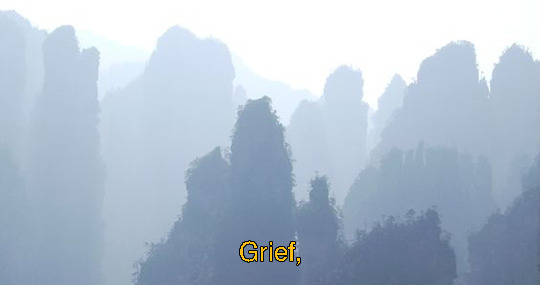
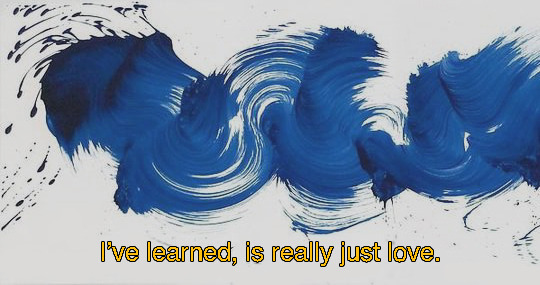
Jamie Anderson // Art piece by Ikenaga Yasunari (x)
“But if it’s love, by God, what is this thing? If good, why then the bitter mortal sting?”
Petrarch, from the ‘Canzoniere’ (tr. Mark Musa)
“bittersweet, undefeated creature – against you there is no defence”
Sappho, from Poems and Fragments (tr. Josephine Palmer)
“And if I should pick out the good in you – each shard of broken light, like glass from the wreck of such beauty, and look at that – or one golden afternoon when you hovered above me in rapture, oh half god – how would I bear to lift my hands, how would I bear to close my eyes and let you fall, and love be damned?”
Cecilia Woloch, “Lucifer, Full of Light,” Carpathia

Ada Limón, Bright Dead Things; “The Good Fight”
“...and if I cut myself, it was you I bled.”
Jeanette Winterson, Lighthousekeeping
“I don’t know what they are called, the spaces between seconds– but I think of you always in those intervals.”
Salvador Plascencia, The People of Paper

Henry Dumas, Knees of a Natural Man; “Valentines”
“No te nombro; pero estás en mí como la música en la garganta del ruiseñor aunque no esté cantando.
I never call your name, but you are in me like the song in the nightingale’s throat even when it’s not singing.”
Dulce María Loynaz, Absolute Solitude: Selected Poems; “Poema LVII” (tr. James O’Connor)
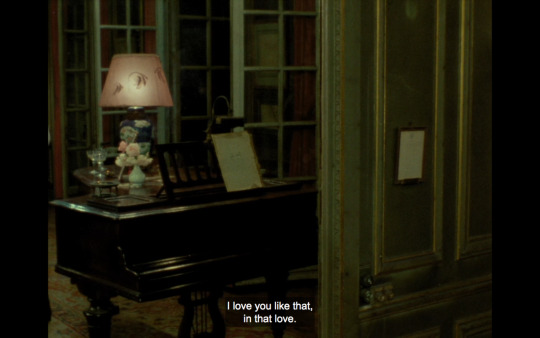
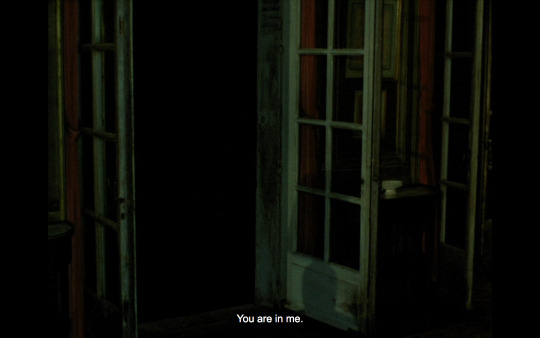
Marguerite Duras - India Song (1975)
“I am sad because I love you, because I love you so much, and because I am not a bee to buzz with you lightly. I am not a flower, not a tree, not a rain-hewn stone. I am not a storm or a cresting wave, not a thorn or a vine. I am not the sun stinging the water, not the moon on the snow. I am not a star in the dark. I am not the dew-wet wind, not the cloud-stained dawn. I am only a girl, a small, plain girl, a girl who must smear her lips in honey to be found sweet.”
Amal El-Mohtar, The Honey Month
“Whether it was the quality of light or the clarity of my feelings for you, I don’t know, but there was softness and no blurring. ‘This is not a lie,’ I said to myself. ‘It may not hold, but it is true.’”
Jeanette Winterson, Lighthousekeeping
“He takes her in his arms. He wants to say I love you, nothing can hurt you but he thinks this is a lie, so he says in the end you're dead, nothing can hurt you which seems to him a more promising beginning, more true.”
Louise Glück, from Averno; "A Myth of Devotion"

Anna Akhmatova, Final Meeting: Selected Poetry (tr. Andrey Kneller)
“Your dying is my dying. / In you I exist—to live or not.”
Euripedes, from Alkestis (tr. Anne Carson)

Richard Siken, “Scheherazade”
“First love tempts / then puts out our eyes.”
Salma al-Khadra al-Jayyusi, from ‘Dearest love - III’ (ed. Charles Doria), Women of the Fertile Crescent: An Anthology of Modern Poetry by Arab Women (ed. Kamal Boullata)

Interactive :: House Saints by Hala Alyan
“We were the heartbreak of truth. / We were willing to break even more.”
Andrea Gibson, from The Madness Vase; “Close For Comfort”
“God, what are you doing to me? / What am I doing to myself?”
Adonis, from ‘Concerto for the Veiled Christ’, Selected Poems (tr. Khaled Mattawa)
“No. I was not afraid of him; but of myself. I seemed reborn in his unreflective eyes, reborn in unfamiliar shapes. I hardly recognized myself from his descriptions of me and yet, and yet – might there not be a grain of beastly truth in them?”
Angela Carter, from “The Bloody Chamber”
“It is true we shall be monsters, cut off from all the world; but on that account we shall be more attached to one another.”
Mary Shelley, Frankenstein; or, The Modern Prometheus

Keaton Henson, “Alright”

Velimir Khlebnikov, The Collected Poems & Writings of V. K. “My Darling,”
“But love is impossible and it goes on / despite the impossible. You’re the muscle / I cut from the bone and still the bone / remembers, still it wants (so much, it wants) / the flesh back, the real thing, / if only to rail against it, if only / to argue and fight, if only to miss / a solve-able absence.”
Ada Limón, Bright Dead Things; “In A Mexican Restaurant I Recall How Much You Upset Me”

The Letters of Frida Kahlo: Cartas Apasionadas, tr. by Martha Zamora
Letter to Diego Rivera, July 23rd, 1935
“I want to give you everything. This is called a sickness.”
Camille Rankine, from Possession

Rainer Maria Rilke, Book of Hours: Love Poems to God; ‘Lösch mir die Augen aus: ich kann dich sehen’, tr. Anita Barrows & Joanna Macy
“Love that incorporates, that devours the other person, that cuts the tendons of the will. Love as immolation of the self.”
Susan Sontag, from Reborn: “July, 1958”
#ask#anon#compilation#quote compilation#the dark's his bone#love as a force of nature#long post#i am. so tired#i hope these make sense#i've got several more asks that i promise i am getting around to --
973 notes
·
View notes